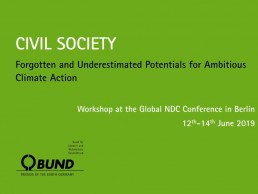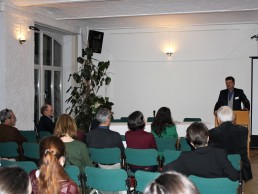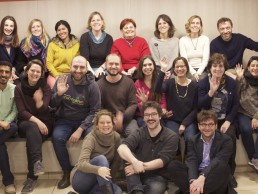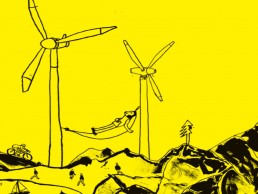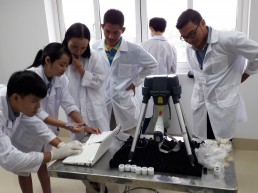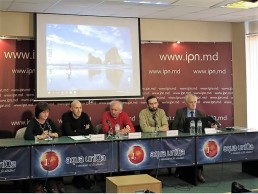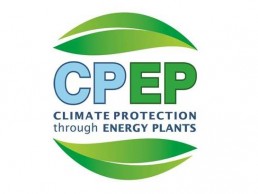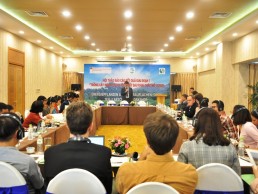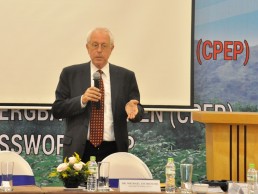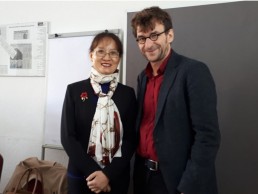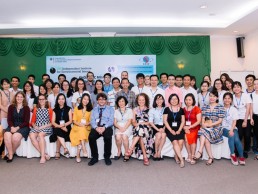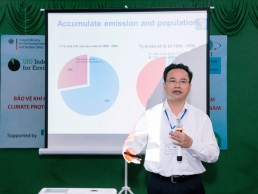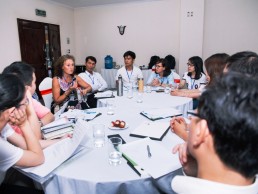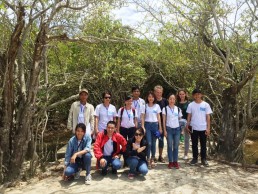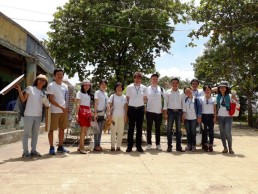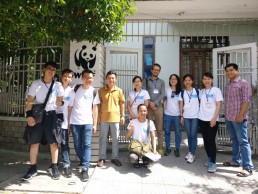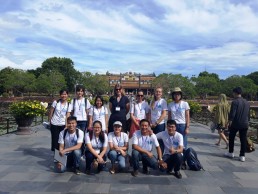Civil Society and Climate Policy: UfU at the Global NDC Conference in Berlin
6. June 2019
Until 2020 all parties that ratified the Paris Agreement must revise their nationally determined contributions (NDCs) and develop long-term goals to reduce national emissions and adapt to the impacts of climate change. Since the first NDCs are not ambitious enough the revision of the targets is absolutely necessary. Non-governmental organizations (NGOs) all over the world criticize the current lag of ambition and fulfil an important role as “watchdogs” as well as catalyst for a transparent and ambitious climate policy that keeps tracks of the 1.5°C target. The “Global NDC Conference” that takes place in Berlin from 12th-14th June 2019 wants to contribute to the implementation and updating of the NDCs. It aims to inspire and enable policy makers and practitioners to accelerate the pace and scale of transformational change via NDC implementation in order to reach the long-term goals of the Paris Agreement. The question is how rapid action can be achieved.
UfU and Friends of the Earth Germany (BUND) will offer answers to that question during a breakout session at the conference. On June 13, 2:15 pm – 4:00 pm they will present first results of their current project “Strengthen civil society for the implementation of national climate policy”. The aim of the project is to enhance the possibilities of participation for civil society organizations in national climate policy in Georgia, Ukraine and Colombia. While BUND strengthens in close cooperation with the partner organizations their climate-political profiles and activities, UfU gives scientific support to the project, e.g. by taking a closer look to questions related to civil society participation in climate policies. As a result, a study on the Status Quo and good practices of civil society participation will be published, while for each partner country, measures leading to the improvement of civil society participation in climate protection strategies will be defined.
The breakout session will highlight the importance and potentials of civil society participation in the NDC process. Representatives from CSOs of Georgia, Ukraine and Colombia will present good practice examples where active engagement of civil society organizations leads to more transparency, higher ambition, stronger acceptance and faster implementation of climate action. Participants will learn about, analyse and discuss different approaches to civil society participation, as well as challenges to it, during planning and implementation phases of climate policies.
More information on the workshop:
June 13, 2019, 2:15 pm – 4:00 pm: “Civil society – forgotten and underestimated potentials for ambitious climate action”
Conference programme:
Global NDC Conference 2019
Examination of Legal Regulation of Plastics in Germany
7. March 2019
To what extend are the use, production and recycling of plastics legally regulated in Germany? UfU investigated this question for a world-wide study conducted by the UN Environment Programme and found that the answer is not simple.
Plastics are regulated by means of various instruments. Many of the regulations in place are based on voluntary participation and are not legally binding. An example for this is the voluntary agreement that sellers charge a fee on plastic bags. The return system for reusable bottles is also based on voluntary participation. In 2013, the government reached an agreement with the cosmetics industry on the voluntary abandonment of the use of microbeads in cosmetics.
There is a legally binding regulation for plastics appearing in the form of packaging waste. A revised version of the applicable piece of law entered into force this year, prescribing higher recycling quota than before. Packaging plastics are dealt with by dual systems such as „Der Grüne Punkt“ or are collected and recycled under the single-use bottle return system.
International comparison draws attention to the fact that there are no bans regarding plastics in Germany. More than 20% of the 127 participating countries have introduced bans regarding specific plastic products (such as plates, straws, etc.), plastic materials (e.g. polystyrene) or production levels.
This situation will change for Germany as of 2021 with the EU-wide prohibiton of various single-use plastic items. The respective EU directive will also introduce other measures, e.g. with regard to the reduction of plastics without alternatives.
For the full report of the study „Legal Limits on Single-Use Plastics and Microplastics: A Global Review of National Laws and Regulations“, please use the following link: https://www.unenvironment.org/es/node/24023
International Symposium: Access to Environmental Information
10. December 2018
The Independent Institute for Environmental Issues had the pleasure to invite highly ranked scholars from different jurisdictions and members of national and international authorities to an exchange on ‘Best Practices on Access to Environmental Information’ in Berlin, the 3rd of December 2018.
This international Symposium was carried out on behalf of the German Federal Environment Agency (UBA) and the German Federal Ministry for the Environment, Nature Conservation and Nuclear Energy. It is integrated into a broader interdisciplinary evaluation process of the German Access to Environmental Information Act.
Non-judicial mechanisms, such as mediation processes or the role of advisory bodies, as well as the practice of private bodies and their obligation to provide access to environmental information ranged among the discussed topics.
A documentation of the Symposium and the presentations is provided here.
Strengthen civil society for the implementation of climate policy
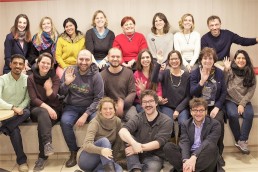
3. December 2018
Shortly before the beginning of the UN Climate Change Conference (COP 24) in the Polish city of Katowice, some colleagues from UfU’s Department of Environmental Law and Participation met with their international project partners BUND (Friends of the Earth Germany), CENSAT Agua Viva (Friends of the Earth Colombia), The Greens Movement of Georgia (Friends of the Earth Georgia) and Ecoaction (Ukraine) for the kick off of their joint project “Strengthen Civil Society for the implementation of national climate policy” in Berlin. In the project, that is funded by the International Climate Initiative, the partner organisations will work together to strengthen participation of civil society in climate policy in their countries.
At this year’s COP in Katowice, the international decision makers will agree on the regime for the implementation of the Paris Agreement. Furthermore, the nationally determined contributions (NDCs) of every country has to be revised and raised in terms of ambition to reach the common goal of keeping global warming well below 1.5°C. This is where the project comes into play: In the next three years, the international project partners will scrutinise the process of NDC revision and demand for a more ambitious climate policy. Moreover, they will use their close ties to civil society to claim for the integration of social aspects, climate justice, and local concerns into measures of climate protection and adaptation.
During the two days kick off event, the partners planned the most important project activities for the following three years in a productive and friendly atmosphere. Afterwards, they jointly took part in a Climate March in Berlin on December 1st. After these three intensive days in Berlin, some of the project partners travelled together to Katowice to take part in the COP.
UfU at COP24 – Workshop „Community Energy for ambitious NDCs“
28. November 2018
At this year’s Climate Conference (COP24) in Katowice, UfU will be present with its project partners BUND and Friends of the Earth International: At the event „Community Energy for ambitious NDCs“, colleagues from UfU and Dr. Sebastian Helgenberger (Institute for Advanced Sustainability Studies – IASS) carry out a workshop about Co-Benefits of Community Energy, which combines contents elaborated in our projects ZIVIKLI and Co-Benefits. Within the event, citizens and representatives of the climate-driven civil society can learn more about the concept of community energy through „good practice“-examples and the joint identification of its Co-Benefits. The groups will also discuss how a fair and sustainable energy transition through community energy can be supported by suitable policy instruments and communication strategies.
The event will take place at Tuesday, December 4, 2018 up from 9:30 a.m. at Hotel Q Plus in Katowice. If you are interested you can register under this link. Here you can find the detailed agenda.
Experts from Vietnam learned the on-site analysis of heavy metals in soils
14. November 2018
From November 5th to 8th 2018, UfU organized a course about the use of mobile X-ray fluorescence analysis for the fast detection of heavy metals in soils. This year’s course was organized in cooperation with Mientrung Institute for Scientific Research in Huế and is part of the project CapaViet, financed by the German Federal Ministry of the Environment, Nature Conservation and Nuclear Safety (BMU).
After mRFA-workshops have been carried out in Northern Vietnam in the last years, this year’s workshop took place in the University city Huế in Central Vietnam.
22 scientists and technical personal from environmental departments of the provinces Da Nang, Ho Chi Minh City, Quang Tri, Quang Ngai and Huế learned in cooperation with Prof. Dr. Tim Mansfeldt, professor for soil geography and soil sciences at the Department for Geosciences at the Geographic Institute of the University of Cologne, how they can use the mRFA-technology for their work.
Besides theoretical lectures and work in the laboratory, the hands-on experience of using the spectrometers in the field was especially useful: The participants could use the mRFA-spectrometers to analyse the heavy metal contents in rice fields near Thanh Toan, in the sludge of a wastewater treatment station at an industrial area near Huế and in a handicraft village specialized in the production of bronze statues.
For the first time, the experts had the opportunity to exchange their knowledge about the state of contaminated soils with specialists from other provinces.
Within the workshop, a new publication has been presented, too: The Manual „Registration of Contaminated Sites in Vietnam: Part 1: Basic Information“, developed from Harald Mark (MSP Bochum) and UfU can be used by the expert to push forward the registration of contaminated areas in their provinces.
Closing events of the project Water Management in Moldova
10. November 2018
On October 30 and 31, the closing events for the project “Capacity Building for Local Water Management in the Republic of Moldova” took place in Chisinau.
The River Basin Council for the Baltata River, which was instated by the project, agreed on a management plan for the next six years. In addition, on October 30, the goals and outcomes of the project were presented to the public in a joint public press conference of UfU and the Moldovian project partners from Eco-Tiras:
After an introductory presentation of the project and its objectives by Karl Stracke (UfU), Prof. Dr. Roman Corobov depicted the impact of climate change on small and medium-sized river systems in the Republic of Moldova.
Following this, the Guide for local authorities and e-NGOs on the management of small and medium river basins in the Republic of Moldova in Romanian and Russian (a short version in English is available here) and a booklet on the status of small and medium river basins in the Republic of Moldova was presented by Ilya Trombitsky (Eco-Tiras).
Petru Vinari of the NGO “Parks of the Future” then reported on the work of the Baltata Water Management Council.
The following day, a closing workshop with representatives of local authorities, ministries, e-NGOs and the OSCE discussed the status of sub-basins councils for small and medium-sized rivers in the Republic of Moldova and future measures to reducing environmental burdens. It was pointed out that a cross-border exchange of experiences with regard to the establishment, organization and operation of river basin councils of small and medium-sized rivers from the Republic of Moldova with the neighboring country Ukraine shall be achieved.
In the context of the project, an UfU-Paper has been published. This paper summarizes a manual for the management of small and medium rivers basins in the Republic of Moldova, which originally was developed and published in Rumanian and Russian language within the project. The paper outlines its most important information for an English speaking audience and can be downloaded here.
Press release in Romanian language: http://ipn.md/ro/arhiva/94453
Press release in Russian: http://ipn.md/ru/arhiva/94453
Final Workshop for Energy Crop Project in Hanoi
12. October 2018
On October 11, the final workshop for the project “Cultivation of Energy Crops on former Mining sites in Vietnam (CPEP)” took place in Hanoi. Approximately 50 guests, including many Vietnamese experts from different scientific and political institutions, participated in the event. 15 experts, who all were involved in this complex project, presented the diverse results. A 80 pages report in English and Vietnamese language was published and handled over to the participants of the workshop. The project started in 2015 and is financed by the International Climate Initiative from the German Federal Ministry for the Environment, Nature Protection and Nuclear Safety (BMU).
The director of the Department for Administration of the Vietnam Environmental Agency (VEA), Mr. Ho Kiem Trung, highlighted in his opening speech the importance of the project for many specialist departments of the Vietnamese environmental administration. According to his speech, the project contributes effectively to the goals of the Vietnamese Green Growth Strategy and to the implementation of the Paris Agreement in Vietnam. Furthermore, Mr. Trung highlighted the importance of the project for the environmental rehabilitation of mining sites in Vietnam. The mining companies that have been involved in the project, Nui Phao Mining and VINACOMIN, assumed a role as pacemakers for all 4000 mining sites in Vietnam.
Andreas Bieber from the German Federal Ministry for the Environment, Nature Protection and Nuclear Safety (BMU) emphasized that the CPEP project was very successful. During the implementation process of the project, many valuable experiences for sustainable and climate-friendly energy crop cultivation in Vietnam were made. Mr. Bieber expressed hope that after the first phase of the project, also a second phase can be implemented in the future.
Already on October 9, a final site-specific workshop took place on one of the project’s pilot sites in the Nui Phao Mine, Thai Nguyen. Here, representatives of the mining company, the University for Agriculture and Forestry of Thai Nguyen, and the provincial environmental administration (DONRE) discussed the site-specific cultivation systems that were implemented within the project.
Lawyers from China visited UfU to learn about environmental law in Germany
28. September 2018
In September, a delegation of 20 Chinese judges from the province Heilongjang visited UfU during a study trip to Germany. In UfU they learned and discussed on access to justice and the growing importance of environmental law in Germany. In a two hours event, UfU Director Dr. Michael Zschiesche and UfU employee Anna-Julia Saiger from the department Environmental Law & Participation answered questions raised by the high court lawyers from China and highlighted that court decisions are an essential part of German constitutional instruments for handling environmentalproblems. This includes both the use of environmental criminal law and lawsuits in the administrative courts, such as the lawsuits of the 300 registered environmental organisations. The lawyers from China were impressed by the diversity of environmental lawsuits at German courts. Also the current case against the use of lignite and the clear-cut of Hambach Forest in Northrhine-Westphalia was part of the following discussion. The event was organised by the Carl Duisberg Centres, a non-profit organisation for international education and human resources development from Cologne. The head of the delegation was Vice President Huaju Li from the Heilongjiang High Peoples Court.
Second Summer School on Climate Change in Central Vietnam
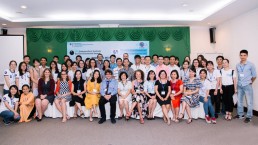
21. August 2018
Which impacts does climate change have on the sea, the coasts, and on regional agriculture in Central Vietnam? How can renewable energy contribute to climate protection and which positive side effects can be reached through climate mitigation measures? These and other questions were the focus of attention during the Second Summer School on Climate Change in Central Vietnam, organised by UfU in cooperation with the Mientrung Institute from the Vietnamese Academy of Sciences. The event was supported by the Robert Bosch Foundation and took place last weekend in the city of Hue, Vietnam.
Approximately 40 participants – young academics and environmental activists with a variety of professional backgrounds – participated in workshops on four different topics: Clamte Change and Oceans, Climate Change and Agriculture, Renewable Energy, and Co-Benefits of Climate Mitigation Measures.
A special highlight were the field trips: The participants visited a coast stretch that is severely affected by impacts of climate change, a restored mangrove forest, an organic garden and an urban gardening project, several renewable energy projects throughout the city, and an eco-friendly tourist company that is active in climate protection.



